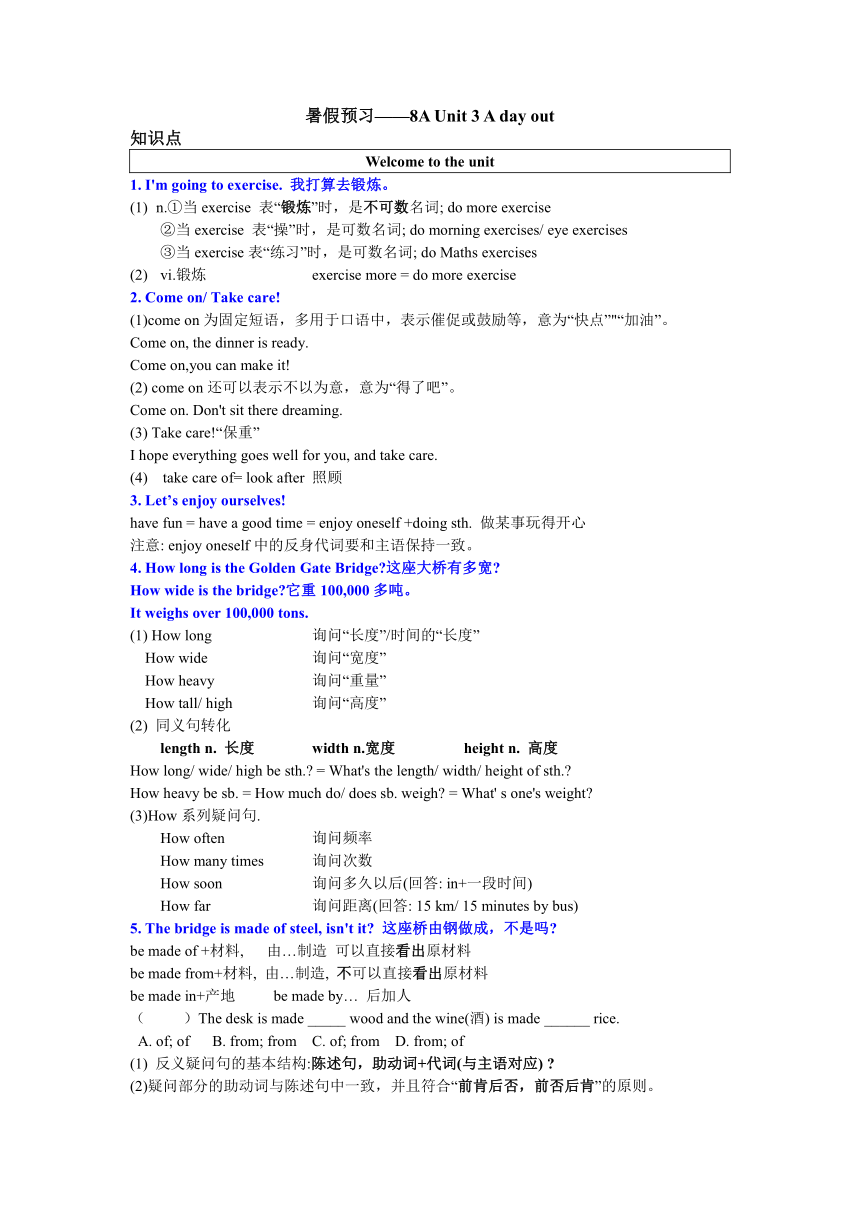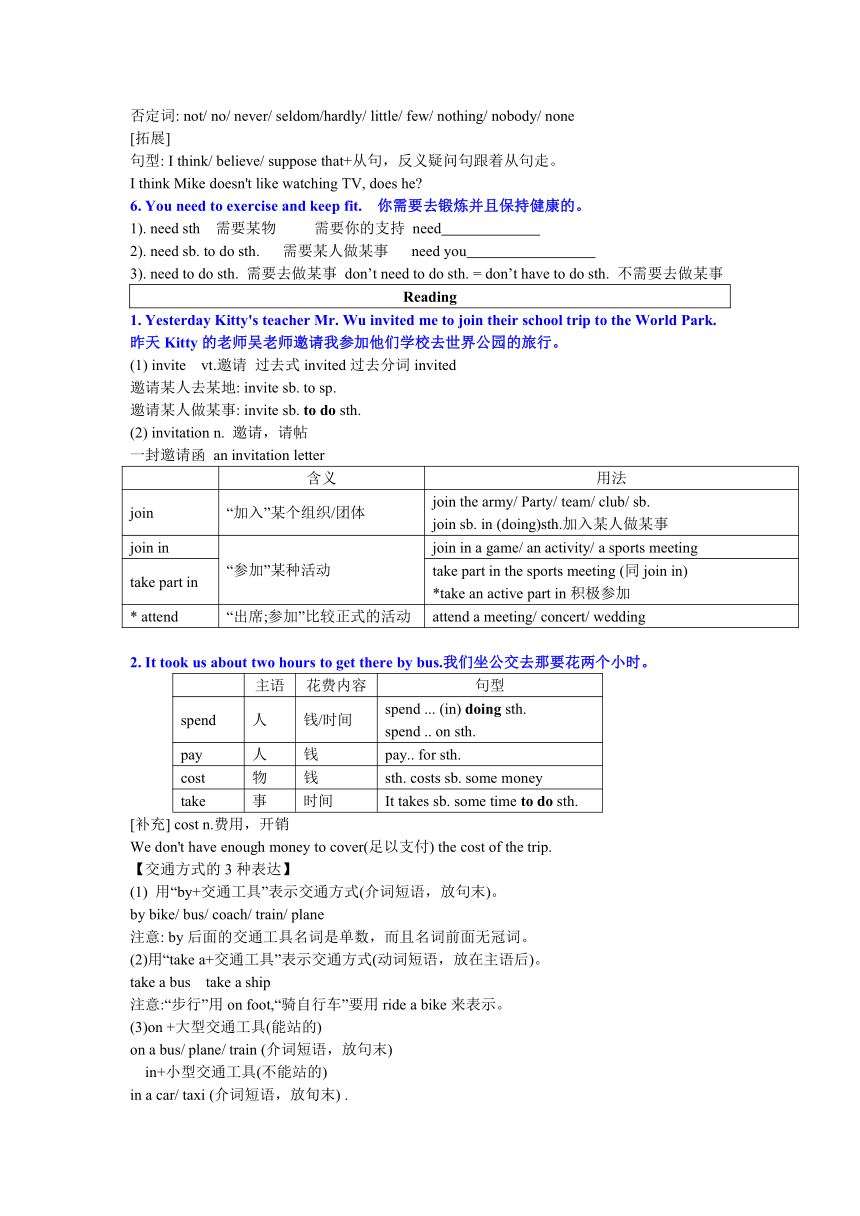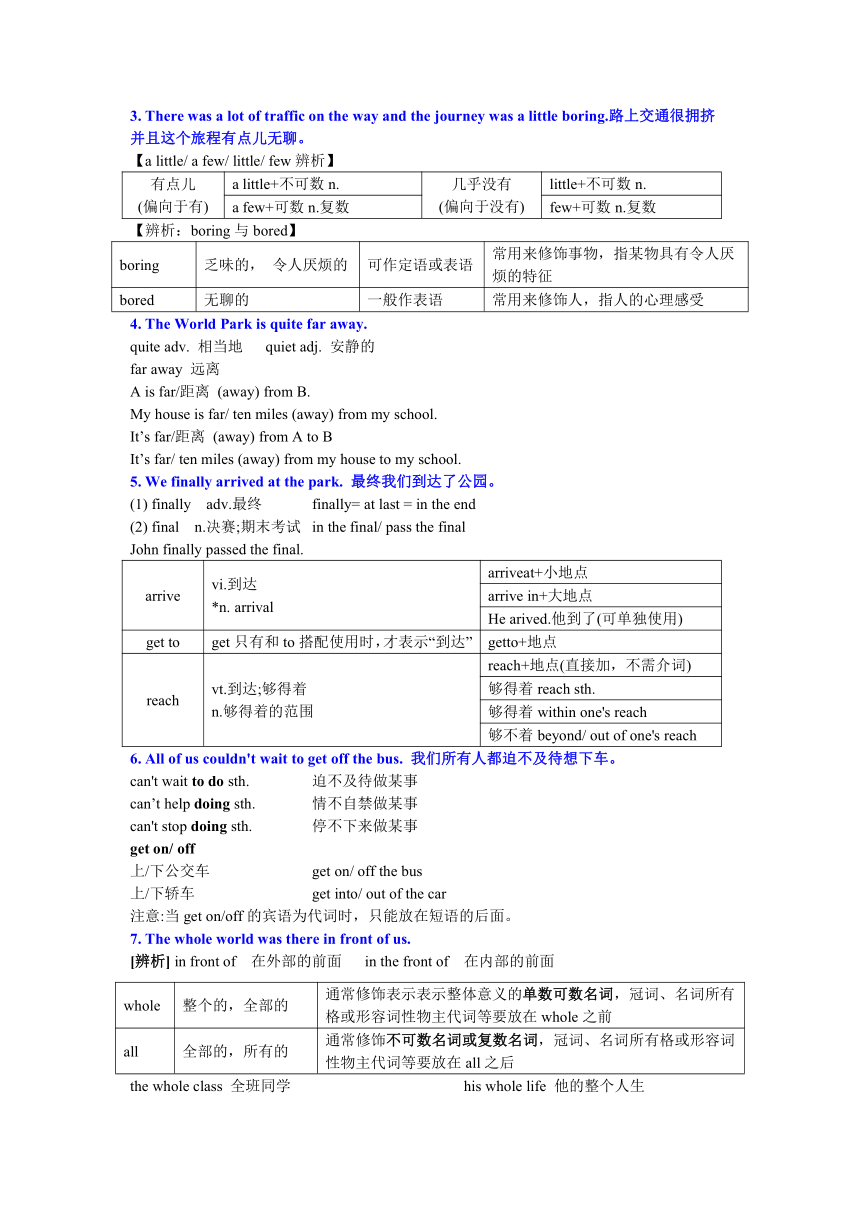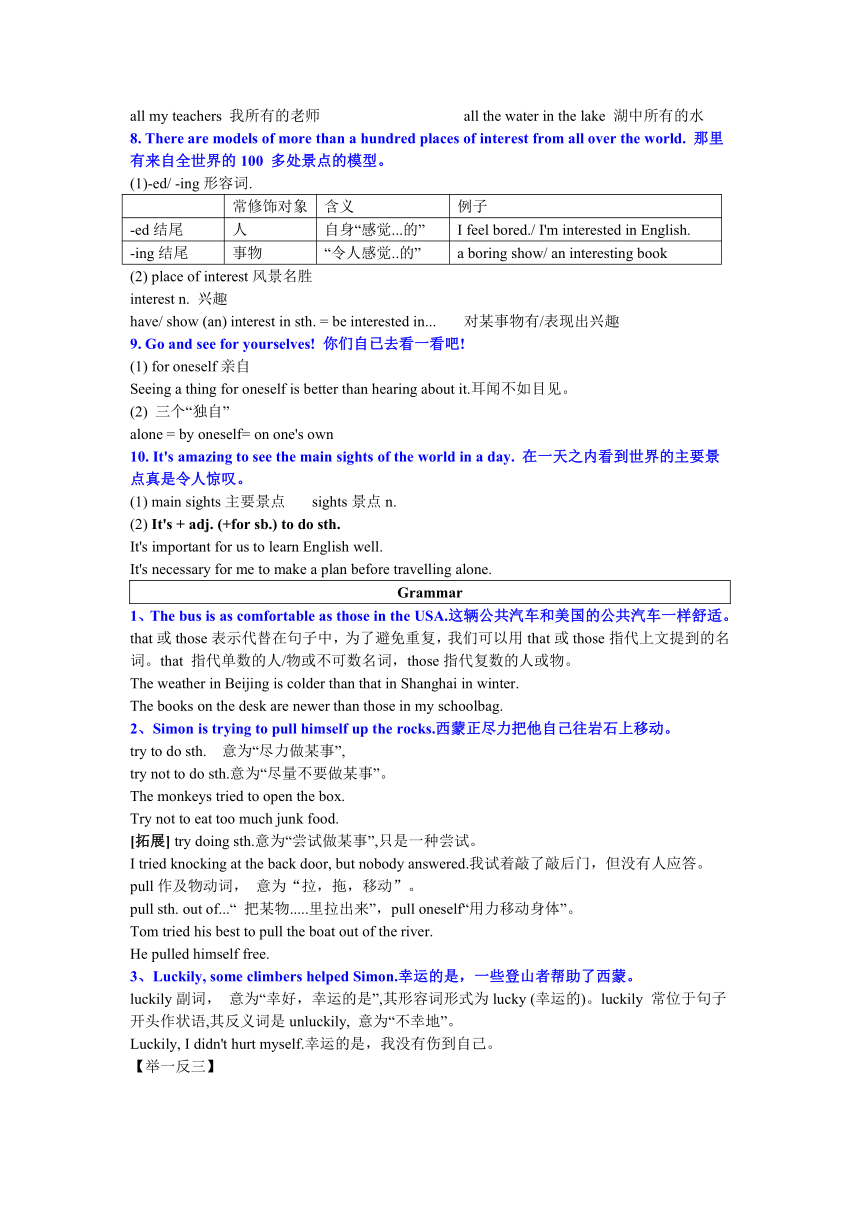2023年牛津译林版英语八年级上册暑假预习讲义 Unit 3 A day out
文档属性
| 名称 | 2023年牛津译林版英语八年级上册暑假预习讲义 Unit 3 A day out |  | |
| 格式 | docx | ||
| 文件大小 | 46.5KB | ||
| 资源类型 | 教案 | ||
| 版本资源 | 牛津译林版 | ||
| 科目 | 英语 | ||
| 更新时间 | 2023-07-29 21:04:17 | ||
图片预览




文档简介
暑假预习——8A Unit 3 A day out
知识点
Welcome to the unit
1. I'm going to exercise. 我打算去锻炼。
n.①当exercise 表“锻炼”时,是不可数名词; do more exercise
②当exercise 表“操”时,是可数名词; do morning exercises/ eye exercises
③当exercise表“练习”时,是可数名词; do Maths exercises
(2) vi.锻炼 exercise more = do more exercise
2. Come on/ Take care!
(1)come on为固定短语,多用于口语中,表示催促或鼓励等,意为“快点”"“加油”。
Come on, the dinner is ready.
Come on,you can make it!
(2) come on还可以表示不以为意,意为“得了吧”。
Come on. Don't sit there dreaming.
(3) Take care!“保重”
I hope everything goes well for you, and take care.
(4) take care of= look after 照顾
3. Let’s enjoy ourselves!
have fun = have a good time = enjoy oneself +doing sth. 做某事玩得开心
注意: enjoy oneself中的反身代词要和主语保持一致。
4. How long is the Golden Gate Bridge 这座大桥有多宽
How wide is the bridge 它重100,000多吨。
It weighs over 100,000 tons.
(1) How long 询问“长度”/时间的“长度”
How wide 询问“宽度”
How heavy 询问“重量”
How tall/ high 询问“高度”
(2) 同义句转化
length n. 长度 width n.宽度 height n. 高度
How long/ wide/ high be sth. = What's the length/ width/ height of sth.
How heavy be sb. = How much do/ does sb. weigh = What' s one's weight
(3)How系列疑问句.
How often 询问频率
How many times 询问次数
How soon 询问多久以后(回答: in+一段时间)
How far 询问距离(回答: 15 km/ 15 minutes by bus)
5. The bridge is made of steel, isn't it 这座桥由钢做成,不是吗
be made of +材料, 由…制造 可以直接看出原材料
be made from+材料, 由…制造, 不可以直接看出原材料
be made in+产地 be made by… 后加人
( )The desk is made _____ wood and the wine(酒) is made ______ rice.
A. of; of B. from; from C. of; from D. from; of
(1) 反义疑问句的基本结构:陈述句,助动词+代词(与主语对应)
(2)疑问部分的助动词与陈述句中一致,并且符合“前肯后否,前否后肯”的原则。
否定词: not/ no/ never/ seldom/hardly/ little/ few/ nothing/ nobody/ none
[拓展]
句型: I think/ believe/ suppose that+从句,反义疑问句跟着从句走。
I think Mike doesn't like watching TV, does he
6. You need to exercise and keep fit. 你需要去锻炼并且保持健康的。
1). need sth 需要某物 需要你的支持 need
2). need sb. to do sth. 需要某人做某事 need you
3). need to do sth. 需要去做某事 don’t need to do sth. = don’t have to do sth. 不需要去做某事
Reading
1. Yesterday Kitty's teacher Mr. Wu invited me to join their school trip to the World Park.昨天Kitty的老师吴老师邀请我参加他们学校去世界公园的旅行。
(1) invite vt.邀请 过去式invited过去分词invited
邀请某人去某地: invite sb. to sp.
邀请某人做某事: invite sb. to do sth.
(2) invitation n. 邀请,请帖
一封邀请函 an invitation letter
含义 用法
join “加入”某个组织/团体 join the army/ Party/ team/ club/ sb. join sb. in (doing)sth.加入某人做某事
join in “参加”某种活动 join in a game/ an activity/ a sports meeting
take part in take part in the sports meeting (同join in) *take an active part in积极参加
* attend “出席;参加”比较正式的活动 attend a meeting/ concert/ wedding
2. It took us about two hours to get there by bus.我们坐公交去那要花两个小时。
主语 花费内容 句型
spend 人 钱/时间 spend ... (in) doing sth. spend .. on sth.
pay 人 钱 pay.. for sth.
cost 物 钱 sth. costs sb. some money
take 事 时间 It takes sb. some time to do sth.
[补充] cost n.费用,开销
We don't have enough money to cover(足以支付) the cost of the trip.
【交通方式的3种表达】
(1) 用“by+交通工具”表示交通方式(介词短语,放句末)。
by bike/ bus/ coach/ train/ plane
注意: by后面的交通工具名词是单数,而且名词前面无冠词。
(2)用“take a+交通工具”表示交通方式(动词短语,放在主语后)。
take a bus take a ship
注意:“步行”用on foot,“骑自行车”要用ride a bike来表示。
(3)on +大型交通工具(能站的)
on a bus/ plane/ train (介词短语,放句末)
in+小型交通工具(不能站的)
in a car/ taxi (介词短语,放旬末) .
3. There was a lot of traffic on the way and the journey was a little boring.路上交通很拥挤并且这个旅程有点儿无聊。
【a little/ a few/ little/ few辨析】
有点儿 (偏向于有) a little+不可数n. 几乎没有 (偏向于没有) little+不可数n.
a few+可数n.复数 few+可数n.复数
【辨析:boring与bored】
boring 乏味的, 令人厌烦的 可作定语或表语 常用来修饰事物,指某物具有令人厌烦的特征
bored 无聊的 一般作表语 常用来修饰人,指人的心理感受
4. The World Park is quite far away.
quite adv. 相当地 quiet adj. 安静的
far away 远离
A is far/距离 (away) from B.
My house is far/ ten miles (away) from my school.
It’s far/距离 (away) from A to B
It’s far/ ten miles (away) from my house to my school.
5. We finally arrived at the park. 最终我们到达了公园。
(1) finally adv.最终 finally= at last = in the end
(2) final n.决赛;期末考试 in the final/ pass the final
John finally passed the final.
arrive vi.到达 *n. arrival arriveat+小地点
arrive in+大地点
He arived.他到了(可单独使用)
get to get只有和to搭配使用时,才表示“到达” getto+地点
reach vt.到达;够得着 n.够得着的范围 reach+地点(直接加,不需介词)
够得着reach sth.
够得着within one's reach
够不着beyond/ out of one's reach
6. All of us couldn't wait to get off the bus. 我们所有人都迫不及待想下车。
can't wait to do sth. 迫不及待做某事
can’t help doing sth. 情不自禁做某事
can't stop doing sth. 停不下来做某事
get on/ off
上/下公交车 get on/ off the bus
上/下轿车 get into/ out of the car
注意:当get on/off的宾语为代词时,只能放在短语的后面。
7. The whole world was there in front of us.
[辨析] in front of 在外部的前面 in the front of 在内部的前面
whole 整个的,全部的 通常修饰表示表示整体意义的单数可数名词,冠词、名词所有格或形容词性物主代词等要放在whole之前
all 全部的,所有的 通常修饰不可数名词或复数名词,冠词、名词所有格或形容词性物主代词等要放在all之后
the whole class 全班同学 his whole life 他的整个人生
all my teachers 我所有的老师 all the water in the lake 湖中所有的水
8. There are models of more than a hundred places of interest from all over the world. 那里有来自全世界的100 多处景点的模型。
(1)-ed/ -ing形容词.
常修饰对象 含义 例子
-ed结尾 人 自身“感觉...的” I feel bored./ I'm interested in English.
-ing结尾 事物 “令人感觉..的” a boring show/ an interesting book
(2) place of interest风景名胜
interest n. 兴趣
have/ show (an) interest in sth. = be interested in... 对某事物有/表现出兴趣
9. Go and see for yourselves! 你们自已去看一看吧!
(1) for oneself亲自
Seeing a thing for oneself is better than hearing about it.耳闻不如目见。
(2) 三个“独自”
alone = by oneself= on one's own
10. It's amazing to see the main sights of the world in a day. 在一天之内看到世界的主要景点真是令人惊叹。
(1) main sights主要景点 sights景点n.
(2) It's + adj. (+for sb.) to do sth.
It's important for us to learn English well.
It's necessary for me to make a plan before travelling alone.
Grammar
1、The bus is as comfortable as those in the USA.这辆公共汽车和美国的公共汽车一样舒适。
that或those表示代替在句子中,为了避免重复,我们可以用that或those指代上文提到的名词。that 指代单数的人/物或不可数名词,those指代复数的人或物。
The weather in Beijing is colder than that in Shanghai in winter.
The books on the desk are newer than those in my schoolbag.
2、Simon is trying to pull himself up the rocks.西蒙正尽力把他自己往岩石上移动。
try to do sth. 意为“尽力做某事”,
try not to do sth.意为“尽量不要做某事”。
The monkeys tried to open the box.
Try not to eat too much junk food.
[拓展] try doing sth.意为“尝试做某事”,只是一种尝试。
I tried knocking at the back door, but nobody answered.我试着敲了敲后门,但没有人应答。
pull作及物动词, 意为“拉,拖,移动”。
pull sth. out of...“ 把某物.....里拉出来”,pull oneself“用力移动身体”。
Tom tried his best to pull the boat out of the river.
He pulled himself free.
3、Luckily, some climbers helped Simon.幸运的是,一些登山者帮助了西蒙。
luckily副词, 意为“幸好,幸运的是”,其形容词形式为lucky (幸运的)。luckily 常位于句子开头作状语,其反义词是unluckily, 意为“不幸地”。
Luckily, I didn't hurt myself.幸运的是,我没有伤到自己。
【举一反三】
Last Saturday, I got to the station late because of the heavy traffic,but______ the train was still there.
A. exactly B. mostly C. luckily D. slowly
climber可数名词, 意为“登山者,攀爬者”,
由“动词climb (爬) +er”构成。
Tom is a good mountain climber.
4、You're lucky you didn't hurt yourself!你太幸运了,没有伤到你自己!
hurt此处用作及物动词, 意为“伤害;使受伤,损害,使痛心”。常指精神上、感情上或肉体上的伤害,含有“强烈的疼痛”之意。
The little boy fell off the tree and hurt himself seriously.
[拓展] hurt 还可用作不及物动词,意为“疼痛”。
Does your right leg still hurt badly
5、Simon and Linda looked at each other.西蒙和琳达相互对视。
each other意为“彼此,相互”,与one another同义。
We should help each other and learn from each other.
Integrated skills
1 、Our school basketball team needs your support!我们学校篮球队需要你们的支持!
support 此处用作不可数名词,意为“支持”。
with one's support“在某人的支持下”,
without one's support“没有某人的支持”,
in support of sb. /sth.“支持某人/某事”。
We couldn't win the match without your support.
She spoke in support of Tom's plan.
[拓展]support还可用作及物动词,意为“支持;赞成,供养”。
I hope you can support me in this!
I have my wife and two children to support.
2、It is in the final of the basketball competition!球队进入篮球比赛的决赛!
final此处用作可数名词, 意为“决赛”。
Simon got to the tennis final.
[拓展] final 还可用作形容词,意为“最后的,最终的”,常在名词前作定语。
This is the final unit of the book.
3、The match takes place on...比赛在...举行。
take place 此处意为“进行,举行”。
The school sports meeting will take place tomorrow.
[辨析] take place与happen
take place一般指非偶然事件的“发生”,即这种事情的发生一定有某种原因或事先的安排
happen一般用于偶然或突发性事件
Great changes will take place in our hometown.
Another earthquake happened there this year.
4、Come and cheer for our team!快来为我们队加油吧!
cheer用作不及物动词,意为“欢呼,喝彩”。
The fans are cheering their favourite team on.
[拓展] cheer还可用作可数名词,意为“欢呼声,喝彩声”。
A great cheer went up from the crowd.
5、Don't forget to bring your friends! 不要忘记带上你们的朋友(前来观看) !
[辨析] forget to do sth.与forget doing sth.
forget to do sth.意为 “忘记要做某事”,指事情未做
forget doing sth.意为“忘记做过某事”,指事情已做
Don't forget to see the doctor.
I forget meeting him in the street.
6、Reach the sports Centre.到达体育中心。
[辨析] reach, arrive与get 都可表示“到达”,但用法不同。
reach及物动词,其后直接跟地点名词作宾语,一般不接地点副词。
arrive 不及物动词,后跟宾语时,表示到达国家与大城市等大地点时,要用介词in;到达村、镇、车站、机场等小地点时,要用介词at.
get不及物动词,其后须先接介词to,再接地点名词,若接地点副词,则不用介词to。
He reached Shanghai last month.
The American students arrived in Beijing yesterday.
We can arrive at the train station at two o'clock.
Write to me when you get to Chongqing.
I usually get home at half past five in the after-noon.
7、cost of the trip旅行费用
cost此处用作名词,意为“费用,价钱”。The cost of... 意为...的费用。
The cost of living now is much higher than before.
花(多少钱),cost的主语通常是物:
The bike costs 800 yuan.
8、Half-time is a 20-minute period for the players to rest.中场休息是供运动员休息的一段20分钟的时间。
(1)20-minute复合形容词,意为“20分钟的”。 在英语中,由“数词+名词(+形容词)”构成的复合形容词,通常在句中作定语,修饰名词。
(2)rest此处用作不及物动词,意为“休息,歇息”。
rest还可用作名词,意为“休息”。
have/take a rest意为“休息一下”。
9、The match will finish before noon.比赛将于中午之前结束。
before 此处用作介词,意为“...之前”,表示时间,后跟名词或动名词。与before相对的词是after意为...之后”。
[拓展] before 与after也可用作连词,引导时间状语从句,表示两个动作的先后顺序。
Wash your hands before you eat.
10、That sounds good... 听起来不错...
sound 此处用作连系动词,意为“听起来”,后面常接形容词作表语,有时也可接介词like
The story sounds boring.
That sounds like a good idea.
[拓展] sound也可用作名词,意为“声音”,指自然界中所有的声音,可以是悦耳的声音,也可以是噪音。
Light travels faster than sound.
【举一反三】
---Do you like having food with music ---Yes. I like soft music. It ______ nice.
A.tastes B. looks C. smells D. sounds
11、Why don't we go to the China Science and Technology Museum 我们为什么不去中国科学技术博物馆呢
Why don't we/you do...是一个提建议的句型,意为“我们/你(们)为什么不做...呢 ”,相当于“Why not do... ”回答时常用“Great. /All right. 1 That's a good idea. /Good idea.”等表示赞同。
12、It's free for groups of 30 or more students.它向30或30人以上的学生团体免费(开放)。
free 此处用作形容词,意为“免费的”,可作定语或表语。
There's some free food in the restaurant.
13、and there was too much traffic on the way... 在路上有太多车辆
辨析:too much,too many与much too
too much 太多 修饰不可数名词,且位于其前 I have too much work to do.
修饰动词,且位于其后 He is fat because he eats too much.
too many 太多 修饰可数名词复数 There were too many people in the shop.
much too 太 修饰形容词或副词 The watch is much too expensive.
Task
1. We hope you can join us.我们希望你能加入我们。
hope 此处用作及物动词,后可接that从句,that 通常省略。
I hope ( that ) you will win the match.
[拓展]
①hope后可跟动词不定式作宾语, hope to do sth. 意为“希望做某事”。
I hope to become a writer.
②hope还可用作名词,意为“希望”。
Don't give up hope. You will succeed if you work hard.
语法点
as…as的用法
当我们要表示双方某方面(如年龄、身高等)程度相同或不同时,常用as…as或not as…as结构,表示“和……一样”或“和……不一样”。
Mary is as careful as Linda.
He does not run as fast as Tom.
在使用同级比较时要注意以下问题:
1.as…as或not as…as属同级比较,在此结构中,要使用形容词或副词的原级。
2.在否定句中,第一个as也可换成so。A is not as/so… as B意为“A不如B…”。
This desk is not as heavy as that one.=This desk is not so heavy as that one.
3.当我们对事物进行比较时,要注意比较的双方必须是同类事物。
Her ruler is as long as mine.
4.当as…as结构涉及数量或程度时,可用as much+不可数名词+as或as many+可数名词复数+as。
You made as many mistakes as I did in the exam.
He made as much money as I did.
5.as…as结构前还可加表示倍数的词。结构为:倍数+as+形容词或副词原级+as。
The room is twice as large as that one.
6.我们可以将“A…+not as(so)+形容词原级+as+B’,的结构转换为比较级。
Tom is not as tall as Mike.=Mike is taller than Tom.=Tom is shorter than Mike.
反身代词
人称 数 第一人称 第二人称 第三人称
单数 myself 我自己 yourself 你自己 himself 他自己 herself 她自己 itself 它自己
复数 ourselves 我们自己 yourselves 你们自己 themselves 他们自己
反身代词的用法:
反身代词与它所指代的一名词或代词形成互指关系,在句中常用作宾语、表语或同位语。
1.反身代词可以用作一些动词(短语)或介词的宾语,此时,句子的主语和宾语必须同一个人或物。
We must look after ourselves and keep fit.
Don’t think too much of yourself!
2.反身代词在句中还可以用作主语或宾语的同位语,用来加强语气,表示“亲自、本人、本身”等意思。但反身代词在句中不能单独作主语。
I don’t need any help.I can do it myself.
3.反身代词在句中还可以用作连系动词的表语。
The little boy in the photo was himself.
【反身代词构成的固定表达】
by oneself意为“独自,凭自己”,相当于alone;
enjoy oneself意为“玩得高兴,过得愉快”,相当于have fun或have a good time;
help oneself to…意为“随便吃或喝点……,随便用……";
say to oneself意为“自言自语”。
lose oneself in....失去自我,沉溺于....
知识点
Welcome to the unit
1. I'm going to exercise. 我打算去锻炼。
n.①当exercise 表“锻炼”时,是不可数名词; do more exercise
②当exercise 表“操”时,是可数名词; do morning exercises/ eye exercises
③当exercise表“练习”时,是可数名词; do Maths exercises
(2) vi.锻炼 exercise more = do more exercise
2. Come on/ Take care!
(1)come on为固定短语,多用于口语中,表示催促或鼓励等,意为“快点”"“加油”。
Come on, the dinner is ready.
Come on,you can make it!
(2) come on还可以表示不以为意,意为“得了吧”。
Come on. Don't sit there dreaming.
(3) Take care!“保重”
I hope everything goes well for you, and take care.
(4) take care of= look after 照顾
3. Let’s enjoy ourselves!
have fun = have a good time = enjoy oneself +doing sth. 做某事玩得开心
注意: enjoy oneself中的反身代词要和主语保持一致。
4. How long is the Golden Gate Bridge 这座大桥有多宽
How wide is the bridge 它重100,000多吨。
It weighs over 100,000 tons.
(1) How long 询问“长度”/时间的“长度”
How wide 询问“宽度”
How heavy 询问“重量”
How tall/ high 询问“高度”
(2) 同义句转化
length n. 长度 width n.宽度 height n. 高度
How long/ wide/ high be sth. = What's the length/ width/ height of sth.
How heavy be sb. = How much do/ does sb. weigh = What' s one's weight
(3)How系列疑问句.
How often 询问频率
How many times 询问次数
How soon 询问多久以后(回答: in+一段时间)
How far 询问距离(回答: 15 km/ 15 minutes by bus)
5. The bridge is made of steel, isn't it 这座桥由钢做成,不是吗
be made of +材料, 由…制造 可以直接看出原材料
be made from+材料, 由…制造, 不可以直接看出原材料
be made in+产地 be made by… 后加人
( )The desk is made _____ wood and the wine(酒) is made ______ rice.
A. of; of B. from; from C. of; from D. from; of
(1) 反义疑问句的基本结构:陈述句,助动词+代词(与主语对应)
(2)疑问部分的助动词与陈述句中一致,并且符合“前肯后否,前否后肯”的原则。
否定词: not/ no/ never/ seldom/hardly/ little/ few/ nothing/ nobody/ none
[拓展]
句型: I think/ believe/ suppose that+从句,反义疑问句跟着从句走。
I think Mike doesn't like watching TV, does he
6. You need to exercise and keep fit. 你需要去锻炼并且保持健康的。
1). need sth 需要某物 需要你的支持 need
2). need sb. to do sth. 需要某人做某事 need you
3). need to do sth. 需要去做某事 don’t need to do sth. = don’t have to do sth. 不需要去做某事
Reading
1. Yesterday Kitty's teacher Mr. Wu invited me to join their school trip to the World Park.昨天Kitty的老师吴老师邀请我参加他们学校去世界公园的旅行。
(1) invite vt.邀请 过去式invited过去分词invited
邀请某人去某地: invite sb. to sp.
邀请某人做某事: invite sb. to do sth.
(2) invitation n. 邀请,请帖
一封邀请函 an invitation letter
含义 用法
join “加入”某个组织/团体 join the army/ Party/ team/ club/ sb. join sb. in (doing)sth.加入某人做某事
join in “参加”某种活动 join in a game/ an activity/ a sports meeting
take part in take part in the sports meeting (同join in) *take an active part in积极参加
* attend “出席;参加”比较正式的活动 attend a meeting/ concert/ wedding
2. It took us about two hours to get there by bus.我们坐公交去那要花两个小时。
主语 花费内容 句型
spend 人 钱/时间 spend ... (in) doing sth. spend .. on sth.
pay 人 钱 pay.. for sth.
cost 物 钱 sth. costs sb. some money
take 事 时间 It takes sb. some time to do sth.
[补充] cost n.费用,开销
We don't have enough money to cover(足以支付) the cost of the trip.
【交通方式的3种表达】
(1) 用“by+交通工具”表示交通方式(介词短语,放句末)。
by bike/ bus/ coach/ train/ plane
注意: by后面的交通工具名词是单数,而且名词前面无冠词。
(2)用“take a+交通工具”表示交通方式(动词短语,放在主语后)。
take a bus take a ship
注意:“步行”用on foot,“骑自行车”要用ride a bike来表示。
(3)on +大型交通工具(能站的)
on a bus/ plane/ train (介词短语,放句末)
in+小型交通工具(不能站的)
in a car/ taxi (介词短语,放旬末) .
3. There was a lot of traffic on the way and the journey was a little boring.路上交通很拥挤并且这个旅程有点儿无聊。
【a little/ a few/ little/ few辨析】
有点儿 (偏向于有) a little+不可数n. 几乎没有 (偏向于没有) little+不可数n.
a few+可数n.复数 few+可数n.复数
【辨析:boring与bored】
boring 乏味的, 令人厌烦的 可作定语或表语 常用来修饰事物,指某物具有令人厌烦的特征
bored 无聊的 一般作表语 常用来修饰人,指人的心理感受
4. The World Park is quite far away.
quite adv. 相当地 quiet adj. 安静的
far away 远离
A is far/距离 (away) from B.
My house is far/ ten miles (away) from my school.
It’s far/距离 (away) from A to B
It’s far/ ten miles (away) from my house to my school.
5. We finally arrived at the park. 最终我们到达了公园。
(1) finally adv.最终 finally= at last = in the end
(2) final n.决赛;期末考试 in the final/ pass the final
John finally passed the final.
arrive vi.到达 *n. arrival arriveat+小地点
arrive in+大地点
He arived.他到了(可单独使用)
get to get只有和to搭配使用时,才表示“到达” getto+地点
reach vt.到达;够得着 n.够得着的范围 reach+地点(直接加,不需介词)
够得着reach sth.
够得着within one's reach
够不着beyond/ out of one's reach
6. All of us couldn't wait to get off the bus. 我们所有人都迫不及待想下车。
can't wait to do sth. 迫不及待做某事
can’t help doing sth. 情不自禁做某事
can't stop doing sth. 停不下来做某事
get on/ off
上/下公交车 get on/ off the bus
上/下轿车 get into/ out of the car
注意:当get on/off的宾语为代词时,只能放在短语的后面。
7. The whole world was there in front of us.
[辨析] in front of 在外部的前面 in the front of 在内部的前面
whole 整个的,全部的 通常修饰表示表示整体意义的单数可数名词,冠词、名词所有格或形容词性物主代词等要放在whole之前
all 全部的,所有的 通常修饰不可数名词或复数名词,冠词、名词所有格或形容词性物主代词等要放在all之后
the whole class 全班同学 his whole life 他的整个人生
all my teachers 我所有的老师 all the water in the lake 湖中所有的水
8. There are models of more than a hundred places of interest from all over the world. 那里有来自全世界的100 多处景点的模型。
(1)-ed/ -ing形容词.
常修饰对象 含义 例子
-ed结尾 人 自身“感觉...的” I feel bored./ I'm interested in English.
-ing结尾 事物 “令人感觉..的” a boring show/ an interesting book
(2) place of interest风景名胜
interest n. 兴趣
have/ show (an) interest in sth. = be interested in... 对某事物有/表现出兴趣
9. Go and see for yourselves! 你们自已去看一看吧!
(1) for oneself亲自
Seeing a thing for oneself is better than hearing about it.耳闻不如目见。
(2) 三个“独自”
alone = by oneself= on one's own
10. It's amazing to see the main sights of the world in a day. 在一天之内看到世界的主要景点真是令人惊叹。
(1) main sights主要景点 sights景点n.
(2) It's + adj. (+for sb.) to do sth.
It's important for us to learn English well.
It's necessary for me to make a plan before travelling alone.
Grammar
1、The bus is as comfortable as those in the USA.这辆公共汽车和美国的公共汽车一样舒适。
that或those表示代替在句子中,为了避免重复,我们可以用that或those指代上文提到的名词。that 指代单数的人/物或不可数名词,those指代复数的人或物。
The weather in Beijing is colder than that in Shanghai in winter.
The books on the desk are newer than those in my schoolbag.
2、Simon is trying to pull himself up the rocks.西蒙正尽力把他自己往岩石上移动。
try to do sth. 意为“尽力做某事”,
try not to do sth.意为“尽量不要做某事”。
The monkeys tried to open the box.
Try not to eat too much junk food.
[拓展] try doing sth.意为“尝试做某事”,只是一种尝试。
I tried knocking at the back door, but nobody answered.我试着敲了敲后门,但没有人应答。
pull作及物动词, 意为“拉,拖,移动”。
pull sth. out of...“ 把某物.....里拉出来”,pull oneself“用力移动身体”。
Tom tried his best to pull the boat out of the river.
He pulled himself free.
3、Luckily, some climbers helped Simon.幸运的是,一些登山者帮助了西蒙。
luckily副词, 意为“幸好,幸运的是”,其形容词形式为lucky (幸运的)。luckily 常位于句子开头作状语,其反义词是unluckily, 意为“不幸地”。
Luckily, I didn't hurt myself.幸运的是,我没有伤到自己。
【举一反三】
Last Saturday, I got to the station late because of the heavy traffic,but______ the train was still there.
A. exactly B. mostly C. luckily D. slowly
climber可数名词, 意为“登山者,攀爬者”,
由“动词climb (爬) +er”构成。
Tom is a good mountain climber.
4、You're lucky you didn't hurt yourself!你太幸运了,没有伤到你自己!
hurt此处用作及物动词, 意为“伤害;使受伤,损害,使痛心”。常指精神上、感情上或肉体上的伤害,含有“强烈的疼痛”之意。
The little boy fell off the tree and hurt himself seriously.
[拓展] hurt 还可用作不及物动词,意为“疼痛”。
Does your right leg still hurt badly
5、Simon and Linda looked at each other.西蒙和琳达相互对视。
each other意为“彼此,相互”,与one another同义。
We should help each other and learn from each other.
Integrated skills
1 、Our school basketball team needs your support!我们学校篮球队需要你们的支持!
support 此处用作不可数名词,意为“支持”。
with one's support“在某人的支持下”,
without one's support“没有某人的支持”,
in support of sb. /sth.“支持某人/某事”。
We couldn't win the match without your support.
She spoke in support of Tom's plan.
[拓展]support还可用作及物动词,意为“支持;赞成,供养”。
I hope you can support me in this!
I have my wife and two children to support.
2、It is in the final of the basketball competition!球队进入篮球比赛的决赛!
final此处用作可数名词, 意为“决赛”。
Simon got to the tennis final.
[拓展] final 还可用作形容词,意为“最后的,最终的”,常在名词前作定语。
This is the final unit of the book.
3、The match takes place on...比赛在...举行。
take place 此处意为“进行,举行”。
The school sports meeting will take place tomorrow.
[辨析] take place与happen
take place一般指非偶然事件的“发生”,即这种事情的发生一定有某种原因或事先的安排
happen一般用于偶然或突发性事件
Great changes will take place in our hometown.
Another earthquake happened there this year.
4、Come and cheer for our team!快来为我们队加油吧!
cheer用作不及物动词,意为“欢呼,喝彩”。
The fans are cheering their favourite team on.
[拓展] cheer还可用作可数名词,意为“欢呼声,喝彩声”。
A great cheer went up from the crowd.
5、Don't forget to bring your friends! 不要忘记带上你们的朋友(前来观看) !
[辨析] forget to do sth.与forget doing sth.
forget to do sth.意为 “忘记要做某事”,指事情未做
forget doing sth.意为“忘记做过某事”,指事情已做
Don't forget to see the doctor.
I forget meeting him in the street.
6、Reach the sports Centre.到达体育中心。
[辨析] reach, arrive与get 都可表示“到达”,但用法不同。
reach及物动词,其后直接跟地点名词作宾语,一般不接地点副词。
arrive 不及物动词,后跟宾语时,表示到达国家与大城市等大地点时,要用介词in;到达村、镇、车站、机场等小地点时,要用介词at.
get不及物动词,其后须先接介词to,再接地点名词,若接地点副词,则不用介词to。
He reached Shanghai last month.
The American students arrived in Beijing yesterday.
We can arrive at the train station at two o'clock.
Write to me when you get to Chongqing.
I usually get home at half past five in the after-noon.
7、cost of the trip旅行费用
cost此处用作名词,意为“费用,价钱”。The cost of... 意为...的费用。
The cost of living now is much higher than before.
花(多少钱),cost的主语通常是物:
The bike costs 800 yuan.
8、Half-time is a 20-minute period for the players to rest.中场休息是供运动员休息的一段20分钟的时间。
(1)20-minute复合形容词,意为“20分钟的”。 在英语中,由“数词+名词(+形容词)”构成的复合形容词,通常在句中作定语,修饰名词。
(2)rest此处用作不及物动词,意为“休息,歇息”。
rest还可用作名词,意为“休息”。
have/take a rest意为“休息一下”。
9、The match will finish before noon.比赛将于中午之前结束。
before 此处用作介词,意为“...之前”,表示时间,后跟名词或动名词。与before相对的词是after意为...之后”。
[拓展] before 与after也可用作连词,引导时间状语从句,表示两个动作的先后顺序。
Wash your hands before you eat.
10、That sounds good... 听起来不错...
sound 此处用作连系动词,意为“听起来”,后面常接形容词作表语,有时也可接介词like
The story sounds boring.
That sounds like a good idea.
[拓展] sound也可用作名词,意为“声音”,指自然界中所有的声音,可以是悦耳的声音,也可以是噪音。
Light travels faster than sound.
【举一反三】
---Do you like having food with music ---Yes. I like soft music. It ______ nice.
A.tastes B. looks C. smells D. sounds
11、Why don't we go to the China Science and Technology Museum 我们为什么不去中国科学技术博物馆呢
Why don't we/you do...是一个提建议的句型,意为“我们/你(们)为什么不做...呢 ”,相当于“Why not do... ”回答时常用“Great. /All right. 1 That's a good idea. /Good idea.”等表示赞同。
12、It's free for groups of 30 or more students.它向30或30人以上的学生团体免费(开放)。
free 此处用作形容词,意为“免费的”,可作定语或表语。
There's some free food in the restaurant.
13、and there was too much traffic on the way... 在路上有太多车辆
辨析:too much,too many与much too
too much 太多 修饰不可数名词,且位于其前 I have too much work to do.
修饰动词,且位于其后 He is fat because he eats too much.
too many 太多 修饰可数名词复数 There were too many people in the shop.
much too 太 修饰形容词或副词 The watch is much too expensive.
Task
1. We hope you can join us.我们希望你能加入我们。
hope 此处用作及物动词,后可接that从句,that 通常省略。
I hope ( that ) you will win the match.
[拓展]
①hope后可跟动词不定式作宾语, hope to do sth. 意为“希望做某事”。
I hope to become a writer.
②hope还可用作名词,意为“希望”。
Don't give up hope. You will succeed if you work hard.
语法点
as…as的用法
当我们要表示双方某方面(如年龄、身高等)程度相同或不同时,常用as…as或not as…as结构,表示“和……一样”或“和……不一样”。
Mary is as careful as Linda.
He does not run as fast as Tom.
在使用同级比较时要注意以下问题:
1.as…as或not as…as属同级比较,在此结构中,要使用形容词或副词的原级。
2.在否定句中,第一个as也可换成so。A is not as/so… as B意为“A不如B…”。
This desk is not as heavy as that one.=This desk is not so heavy as that one.
3.当我们对事物进行比较时,要注意比较的双方必须是同类事物。
Her ruler is as long as mine.
4.当as…as结构涉及数量或程度时,可用as much+不可数名词+as或as many+可数名词复数+as。
You made as many mistakes as I did in the exam.
He made as much money as I did.
5.as…as结构前还可加表示倍数的词。结构为:倍数+as+形容词或副词原级+as。
The room is twice as large as that one.
6.我们可以将“A…+not as(so)+形容词原级+as+B’,的结构转换为比较级。
Tom is not as tall as Mike.=Mike is taller than Tom.=Tom is shorter than Mike.
反身代词
人称 数 第一人称 第二人称 第三人称
单数 myself 我自己 yourself 你自己 himself 他自己 herself 她自己 itself 它自己
复数 ourselves 我们自己 yourselves 你们自己 themselves 他们自己
反身代词的用法:
反身代词与它所指代的一名词或代词形成互指关系,在句中常用作宾语、表语或同位语。
1.反身代词可以用作一些动词(短语)或介词的宾语,此时,句子的主语和宾语必须同一个人或物。
We must look after ourselves and keep fit.
Don’t think too much of yourself!
2.反身代词在句中还可以用作主语或宾语的同位语,用来加强语气,表示“亲自、本人、本身”等意思。但反身代词在句中不能单独作主语。
I don’t need any help.I can do it myself.
3.反身代词在句中还可以用作连系动词的表语。
The little boy in the photo was himself.
【反身代词构成的固定表达】
by oneself意为“独自,凭自己”,相当于alone;
enjoy oneself意为“玩得高兴,过得愉快”,相当于have fun或have a good time;
help oneself to…意为“随便吃或喝点……,随便用……";
say to oneself意为“自言自语”。
lose oneself in....失去自我,沉溺于....
同课章节目录
